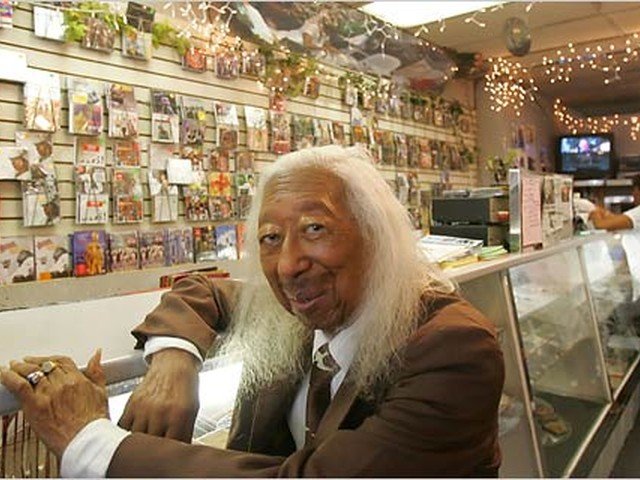Wear My Dawg's Hat
Superstar
Regarding Bobby Robinson's role in the series
Why would the show fictionally kill off Bobby Robinson in 1963?
Without Bobby Robinson around, we wouldn't have the man who later discovered Gladys Knight and released some of the most important early Hip Hop on Enjoy Records.
Bobby just passed away eight years ago and was a Harlem fixture even during my childhood. You would see him everywhere.

Harlem legend dead Bobby Robinson, owner of Happy House on 125th St.
By DAVID HINCKLEY
DAILY NEWS STAFF WRITER
JAN 08, 2011 | 10:33 AM
Musician, personality and business owner Bobby Robinson owned Happy House Records for more than 60 years.
BOBBY ROBINSON, whose tiny record shop on Harlem's 125th St. spawned No. 1 national hits and made him an uptown patriarch for six decades, died yesterday.
He was 93 and had been ill for several years - though he regularly went to work at his shop until it was forced to close in January 2008.
Impeccably dressed, well-spoken and ambitious to make his mark in the entertainment business, Robinson opened Bobby's Happy House in 1946.
His shop was the first black-owned business on 125th St., and within five years he used it to launch a series of record labels.
Sometimes working with his brother Danny, who also had an office on 125th St., Robinson recorded hundreds of artists from Gladys Knight and the Pips to Grandmaster Flash and the Furious Five.
Knight's first hit, "Every Beat of My Heart," was released on Robinson's Fury label.
Robinson, a South Carolina native, had a No. 1 national hit in 1959 with Wilbert Harrison's "Kansas City" - and said years later that a hit of that magnitude crippled his business because he had to press so many copies he couldn't promote any other artists.
But his Red Robin, Whirlin' Disc, Fire, Fury and Enjoy labels became legendary in the rhythm and blues world, and his releases by artists like the Channels, Teenchords and Scarlets helped define the sound of the New York streets through the 1950s.
Robinson ultimately recorded a wide range of artists that included the great bluesman Elmore James, whom Robinson inducted into the Rock and Roll Hall of Fame.
In the late 1970s, Robinson became one of the first label owners to record rap music, cutting artists like Flash, Doug E. Fresh and Spoonie Gee.
NY Daily News - We are currently unavailable in your region
Without Bobby Robinson around, we wouldn't have the man who later discovered Gladys Knight and released some of the most important early Hip Hop on Enjoy Records.
Bobby just passed away eight years ago and was a Harlem fixture even during my childhood. You would see him everywhere.

Harlem legend dead Bobby Robinson, owner of Happy House on 125th St.
By DAVID HINCKLEY
DAILY NEWS STAFF WRITER
JAN 08, 2011 | 10:33 AM
Musician, personality and business owner Bobby Robinson owned Happy House Records for more than 60 years.
BOBBY ROBINSON, whose tiny record shop on Harlem's 125th St. spawned No. 1 national hits and made him an uptown patriarch for six decades, died yesterday.
He was 93 and had been ill for several years - though he regularly went to work at his shop until it was forced to close in January 2008.
Impeccably dressed, well-spoken and ambitious to make his mark in the entertainment business, Robinson opened Bobby's Happy House in 1946.
His shop was the first black-owned business on 125th St., and within five years he used it to launch a series of record labels.
Sometimes working with his brother Danny, who also had an office on 125th St., Robinson recorded hundreds of artists from Gladys Knight and the Pips to Grandmaster Flash and the Furious Five.
Knight's first hit, "Every Beat of My Heart," was released on Robinson's Fury label.
Robinson, a South Carolina native, had a No. 1 national hit in 1959 with Wilbert Harrison's "Kansas City" - and said years later that a hit of that magnitude crippled his business because he had to press so many copies he couldn't promote any other artists.
But his Red Robin, Whirlin' Disc, Fire, Fury and Enjoy labels became legendary in the rhythm and blues world, and his releases by artists like the Channels, Teenchords and Scarlets helped define the sound of the New York streets through the 1950s.
Robinson ultimately recorded a wide range of artists that included the great bluesman Elmore James, whom Robinson inducted into the Rock and Roll Hall of Fame.
In the late 1970s, Robinson became one of the first label owners to record rap music, cutting artists like Flash, Doug E. Fresh and Spoonie Gee.
NY Daily News - We are currently unavailable in your region







 . Bumpy was thinking about the safety of his family at that moment. I’m still surprised Chin didn’t tell the five families about Bumpy who killed a made man.
. Bumpy was thinking about the safety of his family at that moment. I’m still surprised Chin didn’t tell the five families about Bumpy who killed a made man.
 .
.